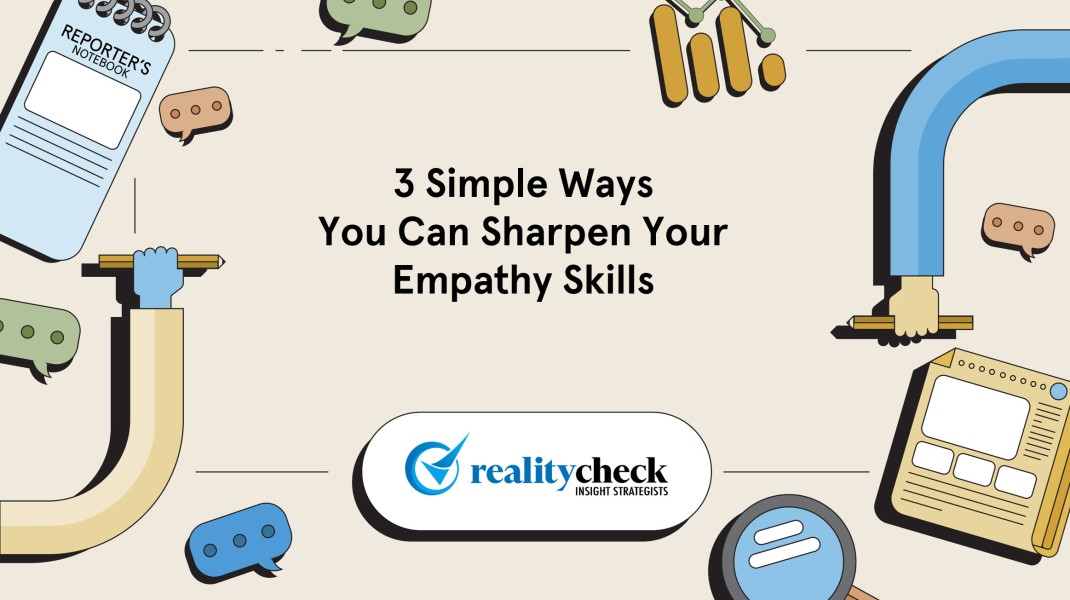Market Research Methods: 3 Simple Ways You Can Sharpen Your Empathy Skills
Empathy has become a bit of a buzzword in marketing and market research in recent years. Many big corporate marketers – wanting to take the trend toward “consumer-centricity” to the next level – started talking about “empathy” several years ago.
At the same time, the desire for empathy has been voiced in American culture as a reaction to our social and political divisions. “New York Times” columnist and author David Brooks’ new book “How to Know a Person: The Art of Seeing Others Deeply and Being Deeply Seen” is a recent example.
In it, Brooks argues that empathy is both something we humans are naturally wired to do but also a skill that requires dedication, intentionality and work.
“Empathy is involved at every stage of the process of getting to know a person… The problem is that a lot of people don’t know what empathy really is. They think it’s an easy emotion: You open up your heart and you experience this gush of fellow feeling with another person. By this definition, empathy feels simple, natural and automatic: I feel for you.
“But that’s not quite right. Empathy is a set of social and emotional skills. These skills are a bit like athletic skills. Some people are more naturally talented at empathy than others; everybody improves with training.”
I couldn’t agree more.
The desire for empathy – even if for the purpose of marketing brands – is a good thing. But I fear that, like a lot of things that blow through our culture, the empathy trend often gets little more than lip service. And, as Brooks says, a lot of people – marketers included – “don’t know what empathy really is” or how to do it.
But if you’re a marketer who genuinely wants a deeper, more empathic connection with your consumer and you believe your brand can actually help people in some way, there are a few simple ways you can start to walk the empathy talk.
Psychologists agree with Brooks that empathy is a learned skill. And like any skill, we get better at it with practice. The problem is that most of us spend our adult lives doing the opposite. We build up defenses to empathic connection because we simply don’t like opening ourselves up to the feelings of others.
For more than a decade, RealityCheck has led Empathic Listening Training work sessions for our clients. We conduct these sessions prior to qualitative market research fieldwork so client teams can be more empathetic listeners to consumers in focus groups and interviews.
We’ve been blessed over the years to have a number of amazing psychologists work with us who are masters at Empathic Listening. (Shout out to @Saul Hopper who led many of these sessions and had a profound impact on many of our clients. Thank you, Saul!)
So, if you’re a marketer committed to empathy, here are a few things you can do to tap into your empathic self, especially when observing focus groups and interviews.
- Learn to listen like a psychologist: The way clinical psychologists listen is not the same way most of us do it. Most of us listen to others with all kinds of biases. We listen for confirmation of our own beliefs. We listen with an air of judgment. We listen for conversational advantage. Or we simply wait for our turn to talk.
Psychologists, on the other hand, are trained to listen empathically. It’s what they call “listening with the third ear.”
When psychologists listen in a clinical setting, they have two ears trained on what their client says. But they have an invisible “third ear” that is focused inward, monitoring their own thoughts, feelings, memories and associations. They use their own thoughts and feelings as clues to what the other person may be thinking and feeling, but not fully expressing.
As such, psychologists find a part of themselves that connects to that other person’s experiences, and they use that as a pathway to deeper understanding.
The next time you’re in a conversation with someone, or observing qualitative fieldwork, listen to the content of what is being said as you normally would. But also dial into your own thoughts and feelings. How do the stories people tell make you feel? What memories and associations are triggered in you by their words? Maybe what you remember, think and feel is connected to what they are thinking and feeling. Finding those connections is the beginning of empathic connection.
- Practice empathic notetaking: This is especially important when observing any form of qualitative research. As you sit behind the observation mirror or watching on webcam, practice Empathic Listening. As you do, in addition to taking notes about what you hear people say, write down your empathic thoughts and feelings.
What are you feeling during the focus group or interview? What memories, associations and thoughts pop into your head? Write those things down and focus on them, even if they seem somewhat random and unrelated. What do you think it was about the respondents’ comments and stories that triggered those thoughts and feelings in you? What do your own thoughts and feelings suggest to you about their experience as a human being?
- Discuss your empathic thoughts and feelings with your teammates: Finally, when you “debrief” after a focus group or interview, resist the temptation to evaluate respondents and instead share your empathic notes with your teammates. Discuss them. Explore what they suggest to you and your teammates about your consumers’ life and experiences. Listen to the empathic thoughts and feelings of your teammates. What can you learn from their empathy experience during fieldwork?
If you do these things with your team during qualitative fieldwork, you’ll find that you not only gain a deeper, more empathic connection to your consumer. You’ll also get to know your team a bit better. When we conduct fieldwork this way, we find it becomes a personal and immersive team-building experience in addition to deepening the research experience.
And if you’re wondering, why do all this? How does this help me market my brand? Here’s why: if you are able to find a part of yourself that connects to your consumer, you’re in a better position to anticipate and respond to their needs; gauge their reactions to your marketing; and imagine what they might desire but not be able to fully express.
In short, you can empathize with them.
As always, please let me know what you think. Post a comment. How do you practice empathy and empathic listening? What methods work for you? And what have you learned about developing your empathic skills?
























